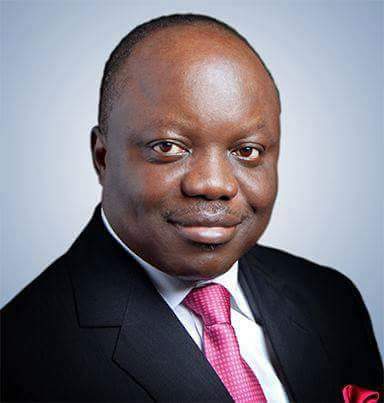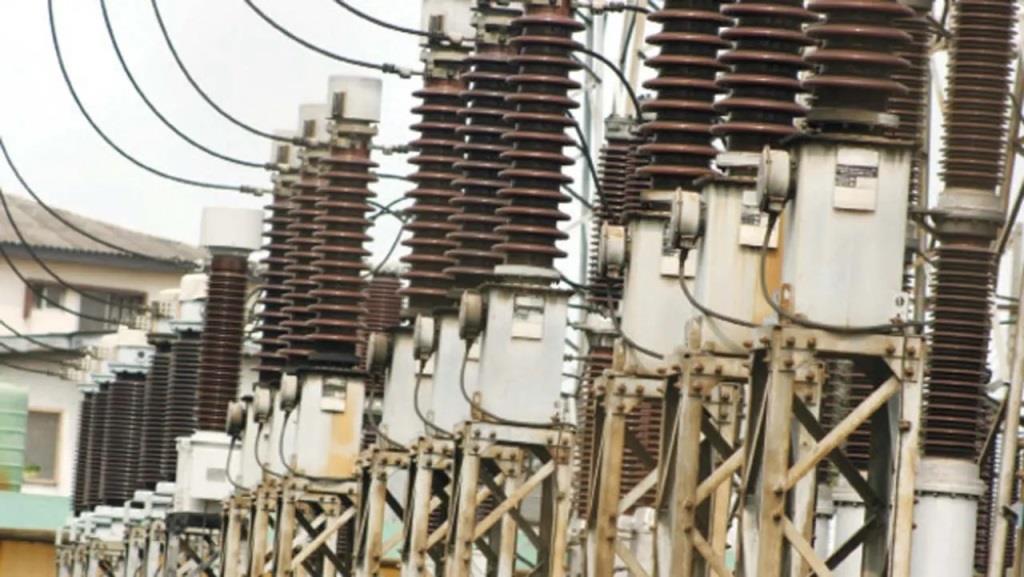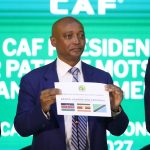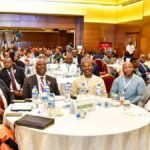General
Uduaghan Says Downgrade of Asaba Airport Political, Blasts Critics

By Modupe Gbadeyanka
Immediate-past governor of Delta State and All Progressives Congress 2019 Delta South senatorial candidate, Dr. Emmanuel Eweta Uduaghan, has opened up on the downgrade of the Asaba International Airport by the Nigeria Civil Aviation Authority (NCAA), few days to his exit as the governor of the oil-rich state in 2015.
The Nigerian government through the NCAA had downgraded the Asaba airport over the failure of Delta State government to put in place safety and security measures at the airport. The development temporarily shut down the operation of the airport as only Dash 8-Q 400 aircraft or its equivalent were allowed in.
But speaking recently in an interview with TELL Magazine, the Itsekiri-born medical doctor revealed that the poor remarks of the airport by the NCAA were politically motivated stressing that it was a regional power-play and blackmail by some aggrieved persons in the state.
In his words: “What they are celebrating as first international flight, what plane was used? A Boeing – 737 – which had been coming in. By the time I was leaving, we had had over 130,000 passengers pass through that airport; some coming with Boeing 737, and smaller planes. There is no president, past president, current president alive today, and very prominent Nigerians that has not passed through that airport and did not have good testimonies about that airport. The airport ran smoothly for three years; there was no issue.
“Then we started having challenges with the run-way, which we started to look at. And it’s not new. Enugu airport was resurfaced last year; they are already having challenges with the runway. Go and check Enugu records; the last visit of governors of the Southeast to Mr President was to complain about the runway in Enugu airport. And this was a runway that was rehabilitated, first before we left, then done again when I had left office. The same company which they recommended to us that should do the Asaba airport, rehabilitated Enugu airport in the last six years twice and still has problems. Abuja airport has problems – runway. Runway problem is not something new, just that they turned this one into politics.
“First, it was announced by the ministry; the ministry had no business announcing it. It’s the business of the FCAA. Some people lobbied the ministry to down-grade it so that I can panic and pump in money and finish it quickly. The same people at that time just felt upset that I had started the Osubi airport runway construction; I had paid some deposit to the company, and their own was that the deposit I had paid for the Osubi airport runway, why would I not use it to complete the Asaba Airport.
“So, there was a regional power-play and blackmail. I am going to mention names in the future, especially for the Osubi airport. We were given a temporary approval by the ministry to commence construction while lobbying for the permanent approval by the FCAA; so, we did not just go there anyhow. The minister came; he went to the place. They gave us temporary go-ahead to do it.
“Of course, ministers were changed. A new minister came in – Osita Chidoka – he was supposed to be my friend; he’s still my friend till today. But when he became minister, he was a little bit hostile. So, I was looking for him; I couldn’t locate him until we were having one rally. I said look, honourable minister, I have been trying to reach you. Can we meet over the airports in Delta? He said fine.
“I went to his office; I was in his office for over four hours discussing the two airports and he said Osubi must stop work. I said why? That we can’t have two airports together like that. For two years, I tried to take over the Osubi airport so that I could increase the length of the runway. You know it was built by Shell, and it was being run by Shell. Shell dribbled us for two years; it was eventually they opened-up to me that they would never give it out because it would affect their operations. I said all these two years, why not say it? So, when they eventually agreed to give it to us that we could do what we had in mind to do, but that we should not touch the short runway, I said okay, available land space, give it to us so that we would do a longer runway; airports don’t have only one runway. Some have three, four. Shell said no. So, that meant we cannot even have land.
“It got to a point when I said okay, I was going to revoke the land; carry your airport away; I will revoke the land. It was then they agreed to cede part of that available land space to us. Then, we acquired more from the communities to get enough land to be able to construct the second runway. So, we started the second one.”
The former governor further revealed that they had cleared, excavated, sand-filled and “work was going on when Chidoka said no, we cannot continue; that there are two airports. I told him no; I appealed to him, but we continued with our construction. He now sent people to come and stop the contractors. Of course, because they were contractors also doing federal jobs, they were afraid to continue in order not to be black-listed. So, that is what happened to Osubi airport hoping that they would force me to go to Asaba airport. But I told them that Asaba airport wasn’t abandoned; we were just having challenges with who the consultant would be.
“FCAA succeeded in forcing a consultant on us. The consultant that eventually did the job was not our consultant; it was nominated by the FCAA officials and they also wanted to force a contractor on us and we said no, that we had our own contractor, let him continue. Fortunately, the contractor that they wanted to force on us was the same contractor that handled the Enugu airport which again failed, so you can’t say he was so good a contractor. So, we had all those challenges. That is part story of the Asaba airport; the full story will come out.”
Responding to the issues raised by the NCAA in the downgrade report, Uduaghan said: “Most of the issues raised were handled. First, they started with fire-fighters; that the fire-fighters we put there were not for airports. We had to order for other ones to specification.
“Then they raised the issue of the hill; of course, the hill is well-known. That because of the hills, they would not allow big planes to come in. So, we had to give the contract concerning the hills to three different companies so that they can bring the hills down as quickly as possible. Of course, because of the cost, that started another controversy.
“They raised the issue of perimeter-fencing, about 70 per cent of which we had done; but before you wake up, Onitsha people had come to cut them, and they took them to go and sell. So, we had to increase security around the place.
“Then the issue of FA lighting so that planes can land at night; we installed FA lighting twice and they would come from across the Niger to steal them away. At the time they closed the airport, the memo had gone through exco, the contract had been awarded for the resurfacing of the runway. They were just waiting for mobilization. So, that statement wasn’t correct.
“The issues they raised, we tackled. And that airport is the most comprehensive airport in Nigeria. I challenge anybody; let us go and debate it. It was just purely regional and ethnic politics that they were doing with the airport. And for me, I am so happy because the point is, I have more people commending me for the airport from that Delta North, prominent sons, than the few persons that were playing politics. I have letters from the Asagba commending me for the airport and some of the things I did in Asaba. So, I am very happy and proud that I made it possible for Asaba to have an airport.”
General
IHS Nigeria Commissions Recreational Park in Omole Estate Phase 1

By Modupe Gbadeyanka
A new community recreational park has been commissioned by IHS Nigeria in Omole Estate Phase 1, Lagos, delivered within a four-month timeline through collaboration with the Omole Estate Executive Committee, the Lagos State Government representatives, and the Lagos State Parks and Gardens Agency (LASPARK).
The Head of Partnerships for LASPARK) Ms Temitope Okumuyide, said the project aligns with the agency’s mandate to promote healthy and safe environments across Lagos State.
“This park contributes to creating functional and enjoyable green spaces for the citizens of Lagos,” she said, thanking IHS Nigeria for helping in promoting a greener environment across the metropolis.
The chairman of Omole Phase 1 Residents Association, Ms Abimbola Osikoya, expressed gratitude for IHS Nigeria’s generous donation.
“In a city as dynamic as Lagos, spaces like this are essential. This park will serve as a place for relaxation, family bonding, healthy living, and neighborly interaction. The measure of a society is how it cares for its people, and IHS has demonstrated this through meaningful community investment,” she said.
Also, the chairman of the Titilayo Adedoyin Community Development Association, Mr Segun Fayemi, described the park as a landmark achievement, adding, “Out of the 18 sectors in this area, only mine has such a facility. I am the happiest man today.”
During the commissioning of the project, the Director of Sustainability for IHS Nigeria, Ms Titilope Oguntuga, described the project as more than infrastructure, highlighting the social and human value of shared public spaces.
“At IHS Nigeria, we believe infrastructure goes beyond connectivity and technology. It is about people and the environments in which they live, work, and thrive. Recreational and green spaces are critical to promoting well-being, inclusion, and stronger communities,” she said.
She noted that the presence of the IHS team at the event reflected the company’s dedication to the project and the host community, adding that, “The turnout today also shows our commitment and excitement to witness the commissioning of this park.”
General
NISO Blames Gombe Station Disturbance for Grid Collapse

By Adedapo Adesanya
The Nigerian Independent System Operator (NISO) has attributed Tuesday’s national grid collapse to a voltage disturbance at the Gombe transmission substation.
A statement issued by the system operator, while providing updates on repair and restoration efforts, stressed that the incident did not amount to a total system collapse, contrary to reports by some media organisations.
Recall that for the second time this year, the national grid recorded a disturbance that left all distribution companies unable to serve their franchise states. It followed a similar occurrence last Friday.
NISO said electricity supply across the affected areas has since been fully restored following immediate corrective actions by its technical teams, adding that the disturbance originated from the Gombe transmission substation before spreading to other parts of the network.
“The national grid has been fully restored, and electricity supply across the affected areas has since returned to normal.”
“The incident only affected part of the national grid, therefore not a total collapse,” NISO added.
“The event was accompanied by the tripping of some transmission lines and generating units, resulting in a partial system collapse.”
The system operator said restoration efforts commenced shortly after the disturbance and were completed within hours.
NISO disclosed that the voltage disturbance quickly propagated across the transmission network, affecting multiple substations.
The disturbance impacted power infrastructure beyond Gombe before stabilisation measures were implemented.
The voltage disturbance spread to the Jebba Transmission Substation, Kainji Transmission Substation was also affected, while the Ayede Transmission Substation experienced disruptions as the disturbance propagated.
According to NISO, although corrective actions were immediately deployed to stabilise the system and restore normal grid operations, some transmission lines and generating units tripped during the incident.
Nigeria’s power grid has continued to experience recurring disturbances in recent years, raising calls for alternative and proper power infrastructure in the country.
In 2025 alone, the national grid collapsed 12 times, with the last recorded incident occurring on December 29.
Tuesday’s incident represents the second grid collapse recorded in 2026, as well as the second in five days.
General
Manufacturers Kick Against NAFDAC’s Renewed Crackdown on Sachet Alcohol

By Adedapo Adesanya
The Manufacturers Association of Nigeria (MAN) has urged the federal government to intervene and restrain the National Agency for Food and Drug Administration and Control (NAFDAC) from renewing its enforcement of the ban on alcoholic beverages packaged in sachets and small PET bottles.
The Director-General of MAN, Mr Segun Ajayi-Kadir, who made the call in a statement, stressed that NAFDAC’s action contradicted directives from the Office of the Secretary to the Government of the Federation (SGF) issued on December 15, 2025, suspending the implementation of the ban.
Mr Ajayi-Kadir said the renewed enforcement also runs contrary to a March 14, 2024, resolution of the House of Representatives, which followed a public hearing with stakeholders, restrained NAFDAC from banning sachet and PET-bottled alcoholic beverages.
According to him, the conflicting directives from government institutions have created confusion among operators in the wines and spirits sector and are disrupting legitimate businesses, stating that sachet and PET-bottled alcoholic beverages were introduced to serve adult consumers with low purchasing power.
He added that smaller portions could help curb excessive consumption rather than encourage abuse.
Mr Ajayi-Kadir noted that locally produced sachet alcohol was manufactured under hygienic conditions and duly certified by regulatory agencies, including NAFDAC, warning that an outright ban could fuel the proliferation of illicit and unregulated products that pose greater health risks.
He also dismissed claims that the products promote underage drinking, saying such assertions had been contradicted by empirical research.
“We would like to further place on record that the untested assertion of abuse by minors as the basis for the ban has been debated by credible and empirical research that was independently conducted.
“The industry, on its own, has even gone further, notwithstanding the report of the survey, to initiate a series of campaigns in respect of responsible alcohol consumption to discourage underage abuse.
“This has so far cost the operators over a billion Naira in advertisements at all levels of media outreach across the federation.
“This has been very impactful in discouraging abuse by underage persons and has deepened the access restriction landscape,” he said.
Mr Ajayi-Kadir added that the ban threatened jobs, livelihoods and government revenue, while also encouraging smuggling and importation of unregulated alternatives.
He reaffirmed the commitment of MAN to working with regulatory agencies to ensure compliance with standards, while appealing to the Federal Government to direct NAFDAC to halt actions that disrupt members’ operations.
-

 Feature/OPED6 years ago
Feature/OPED6 years agoDavos was Different this year
-
Travel/Tourism9 years ago
Lagos Seals Western Lodge Hotel In Ikorodu
-

 Showbiz3 years ago
Showbiz3 years agoEstranged Lover Releases Videos of Empress Njamah Bathing
-

 Banking8 years ago
Banking8 years agoSort Codes of GTBank Branches in Nigeria
-

 Economy3 years ago
Economy3 years agoSubsidy Removal: CNG at N130 Per Litre Cheaper Than Petrol—IPMAN
-

 Banking3 years ago
Banking3 years agoSort Codes of UBA Branches in Nigeria
-

 Banking3 years ago
Banking3 years agoFirst Bank Announces Planned Downtime
-

 Sports3 years ago
Sports3 years agoHighest Paid Nigerian Footballer – How Much Do Nigerian Footballers Earn












